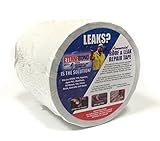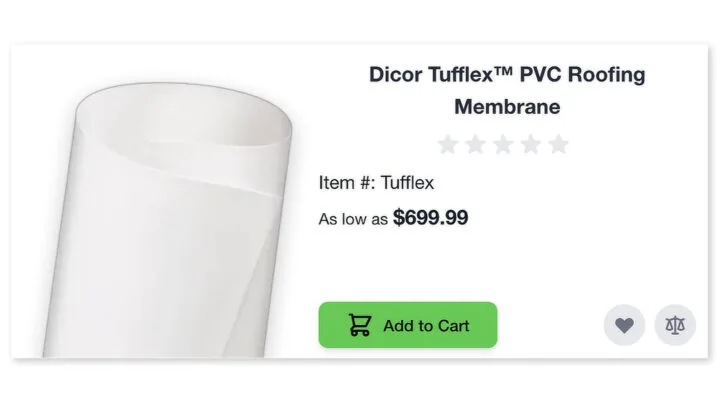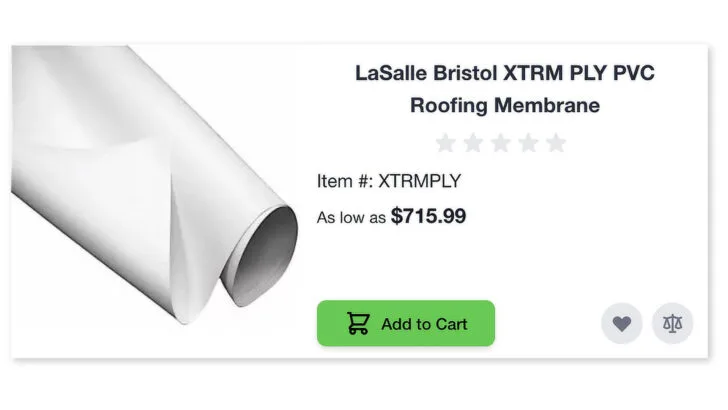We’ve written extensively about RV roof maintenance and the importance of preventing and repairing RV roof leaks. We’ve published posts on the fiberglass RV roof and the RV rubber roof including TPO and EPDM. But another single-ply membrane roofing material is gaining some serious traction for use as RV roofing. In today’s post, we’re looking at the PVC RV roof.
- 1) What Is a Single-Ply Membrane Roof?
- 2) What Is a PVC Roof on an RV?
- 3) What Are the Pros of a PVC RV Roof?
- 4) What Are the Cons of a PVC RV Roof?
- 5) Where to Buy RV PVC Roofing Material
- 6) Does PVC Roofing Cause Streaking on an RV?
- 7) How to Clean a PVC RV Roof
- 8) Free RVing Tips, Tricks, Reviews & Giveaways
What Is a Single-Ply Membrane Roof?
Single-ply membrane roofing material consists of rubberized or synthetic materials used to create a layer of protection on a building’s roof. Generally used on flat or near-flat roofs, single-ply membrane roofs are also used on RV roofs due to their strength, UV resistance, and durability.
There are three main types of single-ply membrane roofs used on RVs:
EPDM
EPDM stands for Ethylene Propylene Diene Monomer, a flexible rubber-like membrane typically used on flat roofs. Available in both sheet and liquid form, an EPDM roof is among the most common types of roofs for RVs. It’s often made from recycled materials like tires, sawdust, and slate dust.
EPDM is lightweight, quick & easy to install, and is one of the least expensive roofing materials. It also has its downsides including the fact that it tends to create black streaks down the sides of RVs and doesn’t offer great resistance to punctures.
TPO
TPO (Thermoplastic Polyolefin / Thermoplastic Olefin) is another common type of “rubber” membrane roofing material that has been a popular choice for RV roofs since the 1990s. TPO is a single-ply membrane that’s both UV-resistant and affordable, with heat-welded seams.
TPO roofs are also among the most common RV roof types and have been many RV manufacturers’ first choice (between TPO and EPDM) for some time.
TPO is durable, resistant to mold, and offers better puncture resistance than EDPM, but doesn’t generally last as long as EDPM does.
PVC
PVC roof membrane is another single-ply roofing solution used on flat and near-flat roofs. Often used in commercial roofing, PVC roofing material is made from a lower percentage of oil and petroleum than either TPO or EPDM rubber roofing.
PVC stands for polyvinyl chloride. It’s a particularly strong and stable material, and the seams can be heat-welded, which allows a PVC roof to expand and contract as needed while offering excellent adhesion. It can also be sealed with solvent welding and attached with adhesives.
For an even more in-depth look at the various types of materials used for RV roofs, check out PVC vs TPO vs EPDM RV Roof Options: Which Is the Best Choice?
What Is a PVC Roof on an RV?
RV PVC roofing is a flexible, durable single-ply roofing membrane capable of meeting the unique challenges of an RV roof.
With high tear and puncture strength, it’s less likely to be damaged by tree branches and other debris. It also offers excellent solar reflectivity which helps to keep an RV cooler.
But there are both advantages and disadvantages to PVC roofing.
What Are the Pros of a PVC RV Roof?
There are several benefits to PVC roofing on an RV.
Strong & Durable
PVC roofing is strong and durable; a PVC RV roof can last 20 years or more. Its puncture resistance can mean less repairing RV roof holes. PVC roofing tends to be stronger and less susceptible to punctures than either EPDM or TPO.
Low Maintenance
PVC roofs offer lower maintenance for RVs in other ways as well. They generally don’t chalk or cause streaks and spots, which is a problem with some RV roofing materials.
Maintenance is still important for a PVC RV roof. Routine inspections of self-leveling lap sealant and/or Eternabond tape will ensure no areas need attention… or allow you to correct them if they do.
No products found.
- ETERNABOND is the only MicroSealant in a tape form available that will stop virtually any leak or water proof any surface in minutes.
- 20 ft Lengths are cut from new master rolls as Eternabond does not offer this length
PRO TIP: Most cheap caulk guns absolutely suck! We bought this one for not too much more money, and it’s the best one we’ve ever owned by far:
- 26:1 THRUST RATIO: 950 pounds of force easily extrudes the thickest of materials
- COMFORTABLE GRIP: Ergonomic rubber trigger and push release
Eco Friendly
PVC roofing is recyclable and is also energy-efficient with excellent solar reflectivity, which keeps an RV cooler.
Lightweight
PVC roofing material is lightweight, making it easier to install and keeping the overall weight down on your RV. PVC is significantly lighter than fiberglass roofing, although all “rubber” roofing is lighter than fiberglass.
What Are the Cons of a PVC RV Roof?
As with most things, PVC roofing has some disadvantages, too.
Cost
PVC roofing typically costs more per square foot than EPDM and TPO. However, the toughness and overall durability of PVC roofing may make it more cost-effective in the long term.
Installation
Although the lightweight nature of PVC roofing makes it easier to install, the old roofing must be removed before installation. This can be a labor-intensive job that adds to the cost. This also may not be a great job for most DIY RVers to tackle themselves unless they’re very confident and competent.
Not As Good in Cold Climates
PVC roofing may not be the best choice for rigs that spend a lot of time in cold climates. When PVC roofing gets too cold, it can become brittle. It can even crack and can even shatter if you walk on it when the temperature is too low.
Where to Buy RV PVC Roofing Material
You can buy PVC roofing material for RVs from any of the following manufacturers:
RecPro Recflex RV PVC Roof Membrane
RecPro Recflex is available in various widths and lengths.
- Recflex is a state-of-the-art roofing membrane engineered to provide premium performance for today's demanding RV roof designs. It is an Olefin-based,...
- Recflex Roofing Membrane is very stretchable and conforms to the multiple contours of today’s RVs in a clean, chalk-free, non-fade membrane.
Dicor Tufflex PVC Roofing Membrane
Dicor Tufflex is a non-fleece-backed PVC White replacement RV roofing membrane available in Polar White in a variety of sizes. Dicor Tufflex is sun, weather, and chemical resistant and is not affected by ponding water.
LaSalle Bristol XTRM PLY PVC Roofing Membrane
LaSalle Bristol XTRM PLY is a flexible, durable PVC roofing membrane designed to meet the challenges of an RV roof. It offers an industry-leading warranty and has very high tear and puncture strength as well as excellent solar reflectivity.
Does PVC Roofing Cause Streaking on an RV?
A common headache with traditional “rubber” roofs is that UV rays and other environmental conditions cause oxidation. This is part of what causes the white-gray or gray-black streaks that run down the sides of RV’s, particularly in light rain or even heavy dew.
One of the benefits of PVC roofing for an RV is that it doesn’t tend to cause the streaking that’s often a problem for owners of RVs with EPDM or TPO roofs.
However, this doesn’t mean that you’ll never find streaks on an RV with a PVC roof. Some streaking is caused by dirt and various minerals and pollutants that are in the water that accumulates from rain on the roof. That dirt and debris are also causes of black streaks that stain the sides of a rig.
For this reason, it’s still important to keep a PVC RV roof clean. For much more information on black streaks on RVs, see our post on RV black streak removers.
How to Clean a PVC RV Roof
With a PVC roof on an RV, cleaning the roof is a simple process. Unlike other “rubber” roofs, PVC doesn’t require the addition of a special UV coating or any special type of cleaning product. A good car wash soap is great for cleaning a PVC RV roof. Abrasive or alkaline cleaners should be avoided as they can damage the PVC or cause it to become cloudy.
Our favorite car wash soap is Meguiar’s Gold Class, and it’s great for the entire RV.
- ONLY ONE STEP: Meguiar's Gold Class foaming car wash soap simplifies your car cleaning routine by combining cleaning and conditioning into one easy...
- CLEAN AND PRESERVE: Featuring an advanced formula, this powerful car shampoo and conditioner not only cleans your car, but it’s also gentle enough...
- 10 inch bi-level brush head
- Use for flow-thru or dip brush
- Fluted fiberglass handle for a comfortable grip in any climate
- Medium duty pole with 1-1/16-Inch composite fiberglass handle
Regardless of which type of RV roof you have, in order to prevent roof leaks, it’s critical to regularly check your RV roof and all of the self-leveling sealant, and any butyl tape, around the fixtures up there. For more information, see our post about RV roof leaks.
Free RVing Tips, Tricks, Reviews & Giveaways
As 20-year full-timers, we share everything we’ve learned about RVing over the years. Join our online community to receive a wealth of great RVing knowledge delivered daily to your inbox.
Whether you’re a new RVer or a seasoned full-timer, you’ll love the wide range of RVing topics we cover. Don’t miss a single article or any of our famous Giveaways. Subscribe to our newsletter today!









